Only Military Option Will Stop Iran - Bibi To Biden
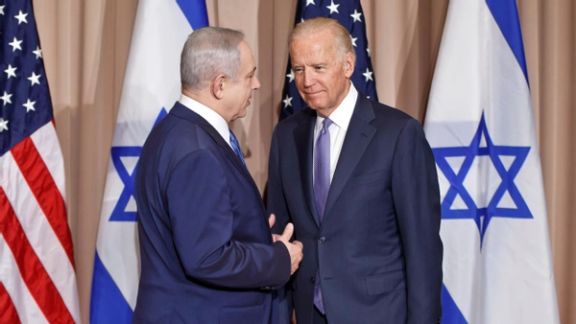
In a meeting with visiting US President Joe Biden on Thursday, former Israeli Premier Benjamin Netanyahu stressed the necessity of a military option against Iran.

In a meeting with visiting US President Joe Biden on Thursday, former Israeli Premier Benjamin Netanyahu stressed the necessity of a military option against Iran.
Netanyahu, who is now head of the opposition, told Biden that "if and when" he returns to office, his hard stance on Iran will remain the same, claiming that “Biden said he agrees with my position and I was glad to hear that. This is what I will do if and when I return to the Prime Minister's Office."
Discussing the Iranian nuclear issue, Bibi said, "Without a reliable military option, it will be impossible to stop Iran, and if it is not deterred, the military option must be exercised."
Netanyahu added that to ensure US-Israeli friendship for the next 40 years “we have to address the Iranian threat,” noting that "Economic sanctions and even a defensive pact are not enough, there is a need for a military-offensive option on Iran, without it, nothing will work."
Earlier in the day, Biden and Israeli Prime Minister Yair Lapid signed a declaration on a shared commitment to Israel’s military supremacy and preventing Iran from building nuclear weapons.
Washington pledged further “defense assistance” on top of the $38 billion 10-year Memorandum of Understanding signed in 2016 under President Barack Obama and the $1-billion assistance after the 2021 Israeli-Palestinian violence centered on Gaza.
The document – dubbed the ‘Jerusalem Declaration’ – singled out as integral “to this pledge…the commitment never to allow Iran to acquire a nuclear weapon.” The US was, it said, “prepared to use all elements of its national power to ensure that outcome.”
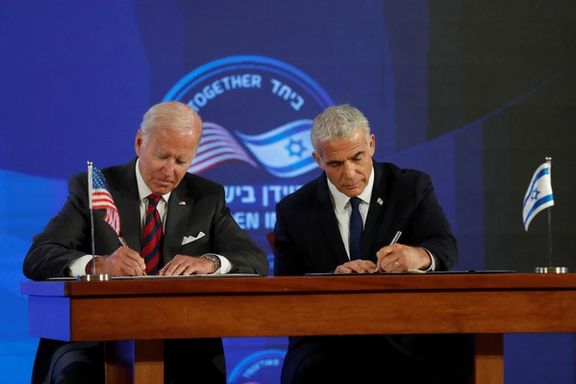
Wednesday’s US-Israel Joint Declaration gave a shared commitment to Israel’s military supremacy and prevent Iran from building nuclear weapons.
The declaration, with the text signed by Israeli Minister Yair Lapid and United States President Joe Biden released Thursday, expressed “unshakeable US commitment” to Israel’s “military edge.” Washington pledged further “defense assistance” on top of the $38 billion 10-year Memorandum of Understanding in 2016 under President Barack Obama and the $1-billion assistance after the 2021 Israeli-Palestinian violence centered on Gaza.
The document – dubbed the ‘Jerusalem Declaration’ – singled out as integral “to this pledge…the commitment never to allow Iran to acquire a nuclear weapon.” The US was, it said, “prepared to use all elements of its national power to ensure that outcome.”
While US officials have previously spoken vaguely of means to preclude an Iranian weapon, this is apparently the first time such a commitment has been made openly with Israel, which is widely believed to have carried out attacks on Iranian nuclear sites, which are monitored by the International Atomic Energy Agency (IAEA), and killed its scientists.
Lapid reportedly told Biden that the time had come to end diplomatic efforts to revive the 2015 Iran nuclear deal, from which Trump withdrew the US and which Biden had an election commitment to revive.Lapid argued instead for a “credible military threat.”
Aside from the nuclear issue, Biden committed the US “together with other partners to confront Iran’s aggression and destabilizing activities, whether advanced directly or through proxies and terrorist organizations such as Hezbollah, Hamas, and Palestinian Islamic Jihad.”
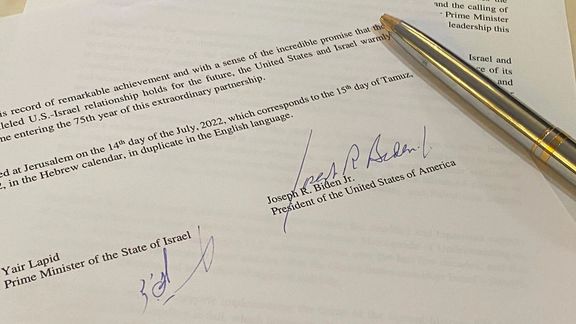
‘Robust regional architecture’
While the declaration noted Biden’s “longstanding and consistent support of a two-state solution” allowing a Palestinian state in Israeli-occupied territories, it pledged to work against “all efforts to boycott or de-legitimize Israel” and “to firmly reject the BDS campaign.” Calls for boycotting and disinvestment from Israeli entities active in the occupied West Bank have gathered momentum since rights groups including Amnesty International concluded that Israeli military rule amounted to a form of apartheid where Jewish settlers had political and civil rights denied to Muslims and Christians.
The Biden-Lapid declaration anticipated Biden’s arrival in Saudi Arabia Friday as part of a process of “building a robust regional architecture.” It hailed Israel’s 2020 ‘normalization’ agreements with Bahrain, Morocco, and the United Arab Emirates as important “to the cause of regional security, prosperity and peace” and hailed March’s Negev summit in Israel – attended by the foreign ministers of of Bahrain, Egypt, Israel, Morocco and the United States – as “efforts to build a new regional framework that is changing the face of the Middle East.”
Officials and hardliner media in Tehran have already condemned the emergence of an Israeli Arab alliance, telling the United States that no regional arrangement “can save the Zionist regime”.
Nour News, close to Iran’s supreme national security council on Thursday threatened that Tehran can use “new methods” for “punishing” Israel, and energy shipments could be endangered in the region. This was a little-veiled threat to shipping in the Persian Gulf and possibly in the Red Sea, where Iran’s Houthi allies have attacked vessels in the past.
Iranian government media simply carried the news of the US-Israeli declaration, as a first reaction Thursday afternoon, but further official and semi-official reaction will follow in coming days.
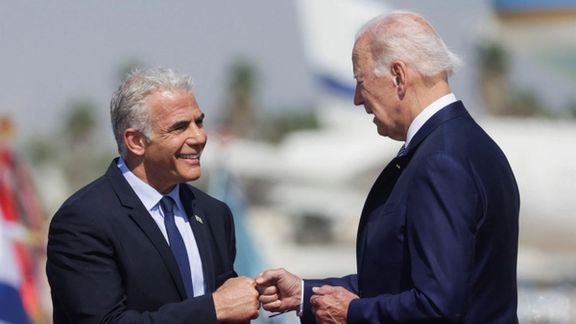
Iran might resort to new methods to “punish” Israel, a website close to its security establishment said on Thursday, as President Joe Biden visits the region.
Nour News close to Ali Shamkhani, the secretary of the supreme national security council also said that “Any steps to disrupt the current security order in West Asia can impact other spheres, such as transportation and transit of energy and add to the existing global food and energy crisis.”
The reference to transportation of energy could be a threat to shipping in the Persian Gulf. Iran in recent and distant past has repeatedly made such threats and in the summer of 2019, attacks took place against many tankers, which were generally blamed on Iran.
The note published by the “international desk” of Nour News also dangled the prospect of continued nuclear talks, as President Joe Biden on Wednesday told an Israeli television that he is willing to use force against Iran “as a last resort.”
The article went on to argue that Israel has always opposed the 2015 nuclear agreement known as JCPOA and is determined to block its revival. In a candid admission of mysterious incidents, Nour News said that Israel has intensified attacks inside Iran in the past year, “to perhaps create chaos and fish in muddy waters…”
Talks since April 2021to revive the JCPOA are now stalled, with Iran speeding up its uranium enrichment, which is seen as a serious step to approach a nuclear weapons threshold.
The United States “has adopted silence toward Israel’s destructive acts,” the article stressed, and has shown its inclination to use these acts to get leverage in nuclear talks. But Washington should know that “Israel’s mischiefs can, under some circumstances, cause loss of control over the situation and lead to the use of different options for punishing the usurping Zionist regime.”
Nour News then picked up the issue of a proposed joint air defense network between Israel and Arab states, ridiculing Israel’s capabilities. It said the current Israeli air defense weapons were for stopping small, short-range rockets and were ineffective against ballistic and cruise missiles, a reference to Iran’s long-range capabilities that have created concern among regional countries.
Nour News had issued a warning on July 10 about US, Israeli and Arab plans to set up a regional air defense system. It said that “the creation of a joint defense pact in the region by the US with participation and hidden management of Zionists is a threatening act.”
The plan to set up coordination between air defenses of Saudi Arabia, Israel, the United Arab Emirates and other allies goes back months. The Wall Street Journal reported in June that a secret meeting took place between top military officers of the countries involved in Sharm El Sheikh, Egypt in March.
Biden’s trip to Israel and Saudi Arabia, his recent tougher stance toward Iran, as wells as talk of steps to establish cooperation between Riyadh and Tel-Aviv have apparently rattled Tehran officials.
President Ebrahim Raisi on Wednesday also warned about a regional alliance aimed at Iran. "if American visits to the regional countries are aimed at strengthening the position of the Zionist regime and normalizing its relations with certain countries, their efforts will not in any way bring about security for the Zionists."
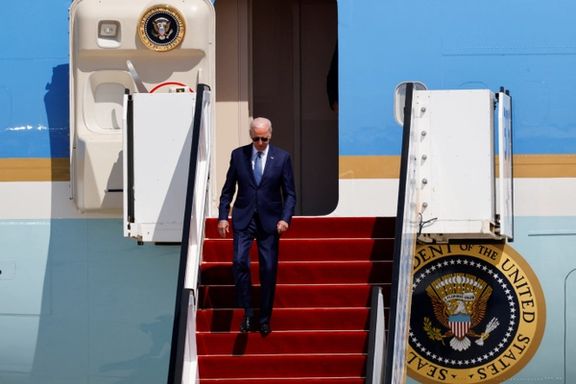
US President Joe Biden reiterated upon arrival in Israel on Wednesday that the only thing worse than Iran now is an Iran with nuclear weapons.”
Biden told Israel’s Channel 12 that he still believes the US should return to the 2015 nuclear deal – formally known as the Joint Comprehensive Plan of Action (JCPOA), noting that the decision is now in Iran’s hands.
About whether the US would use force to stop Iran from attaining a nuclear weapon, Biden said "as a last resort, yes."
He, however, once again rejected Iran’s demand that the Revolutionary Guards (IRGC) be taken off Washington’s list of foreign terrorist organizations as part of any agreement. Asked if he would hold to that position even if it meant no deal, Biden said, “Yes.”
Israel was a staunch opponent of the 2015 nuclear deal and welcomed then-President Donald Trump’s decision to unilaterally withdraw from it, which led to its unraveling, a decision Biden calls a “gigantic mistake” that accelerated Iran’s progress towards a nuclear weapon.
He declined to comment on any discussions with Israel about using military force against Iran, but assured Jerusalem that he will work with whomever is elected as Israel’s next prime minister, even Benjamin Netanyahu, with whom he has had strained relations. “We’re committed to the state, not an individual leader.”
“In order to stop regimes like Iran, economic sanctions are not enough, diplomatic sanctions are not enough. There is no way to stop Iran without a credible military threat,” said Netanyahu, who was not part of the official greeting ceremony for the US president but did shake his hand.

As President Joe Biden arrived in Israel Wednesday, he did not rule out the use of force as a last resort to prevent Iran from building nuclear weapons.
However, in the bigger scheme of politics in the volatile region, analysts disagreed over whether his Mid East tour was a move to reshape regional politics or a doomed exercise to keep down oil prices.
Ahead of Biden reaching an Arab summit Friday in Saudi Arabia, Sheikh Mohammed bin Zayed al-Nahyan, president of the United Arab Emirates, said in a televised address Wednesday that the UAE would extend a “hand of friendship” to all countries seeking peaceful coexistence.
Friday’s meeting of the six-country Gulf Cooperation Council, Egypt, Iraq, and Jordan has been widely billed as a means to take forward shared air-defense measures between Gulf Arab states, Israel, and the US to counter any threat from Iranian or Iranian-supplied missiles and drones. Biden also told Israeli Channel 12 that the US would if needs be use force to preclude Iran developing a nuclear weapon.
The statement underlined the dimmer prospects of an agreement to revive the 2015 nuclear deal, and a tougher posture by Biden.
Incremental measures are also expected between Saudi Arabia and Israel, including overflight rights but stopping short of Israel’s ‘normalization’ agreements with the UAE and Bahrain brokered by the Trump administration in 2020. Saudi Arabia has so far upheld Arab League policy, dating to 2002, that normalization required Israeli acceptance of a viable Palestinian state.
American media meanwhile are interested in whether Biden can persuade the Saudis to pump more oil and ease inflationary pressure at US gas stations currently selling at near $5 a barrel.
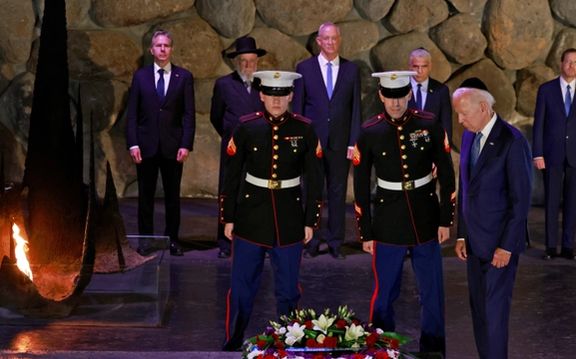
Arriving at Ben Gurion Airport, Biden bumped fists with Israeli caretaker Prime Minister Yair Lapid and proclaimed, “not all Zionists are Jews.” Arguing the visit flew in the face of Palestinian rights despite Biden’s formal commitment to a “two state” future, Wasel Abu Youssef, an executive member of the Palestine Liberation Organization (PLO), said the trip aimed at “integrating the occupation state in the Arab region and…[building] a new alliance against Iran.”
‘Decisive response’
Iranian President Ebrahim Raisi was reported to tell the cabinet Wednesday that Iran was “watching the region closely” as Biden’s trip developed.
“If the American officials’ visits to the regional states are aimed at strengthening the position of the Zionist regime and normalizing its relations with certain countries, their efforts will not in any way bring about security for the Zionists,” Raisi said. “Tehran has repeatedly told those who convey US messages to Iran that the slightest move against Iran’s territorial integrity will face a decisive response.”
In a Washington Post opinion piece ahead of his visit headlined ‘Why I’m Going to Saudi Arabia,’ Biden suggested he wanted human rights upheld in the Middle East and any US combat role ended. He claimed that the “frequency of Iranian-sponsored attacks compared with two years ago” had “dropped precipitously” and that the region was less pressurized, partly due to Iraq mediating between Iran and Saudi Arabia.
‘Zero-sum diplomacy’
The build-up to Biden’s trip has seen widely different assessments by analysts. Criticizing the president, Daniel Levy, president of the US Middle East Project and a senior advisor in the prime minister’s office under Ehud Barak (1999-2000), accused Biden of “jumping on the normalization bandwagon.” Writing on the Responsible Statecraft website July 12, Levy said Biden was working to “give Israel a freer hand in trampling Palestinian rights and to advance a militarist zero-sum approach to regional ‘diplomacy’.”
By contrast, Hussein Ibish of the Arab Gulf States Institute, wrote July 11 for Bloomberg that Biden wanted extend to the Middle East his “success in reunifying and revitalizing the alliance of Western democracies..[by giving] Washington its most dynamic international leadership role in decades.”
Ibish urged Biden to offer the Saudis “some carrots, mostly in terms of military hardware,” while working to “reinforce the primacy of countering Iran,” while the Saudis “seriously undertake aiding the US to manage energy pricing, beyond the modest production increases reached by the Organization of the Petroleum Exporting Countries…”
In the Middle East, Ibish wrote, “the common adversary is Iran, not Russia…” All six Arab states at Friday’s summit should acknowledge they are “best protected through a US-led grouping aimed at maintaining regional order and stability, to which they can each contribute and from which they will all benefit.”

While many urge Tehran to make a deal with Washington to rescue its economy, President Ebrahim Raisi says Iran will not retreat from its "rightful positions."
Raisi further advised the United States on Wednesday "to see the facts to learn from the past and not to repeat the failed experience of the ‘maximum pressure’ policy on the Iranian nation," official news agency IRNA quoted him as saying.
He reminded that US officials have repeatedly said that the pressure Washington imposed on Iran was unprecedented, but "the spokesperson of the State Department has officially announced that these pressures did not work in any way and failed shamefully."
Earlier, Iran’s Supreme Leader Ali Khamenei had also quoted the State Department spokesman, Ned Price, to argue that US sanctions were a failure.
Raisi went on to say, "the US claims that Iran should return to the nuclear deal while Iran has never withdrawn from the JCPOA." Meanwhile, Raisi advised the Americans not to speak to Iranians using "the language of coercion.”
Raisi, who like other Iranian senior officials, appeared to be shaken by the possible military implications of the US President's regional tour, warned that "if American visits to the regional countries are aimed at strengthening the position of the Zionist regime and normalizing its relations with certain countries, their efforts will not in any way bring about security for the Zionists."
Referring to the new alliances in the region between Israel and regional Arab states, and the idea of creating an integrated air defense in the region to thwart Iran's threats, Raisi said "Iran is watching the region closely," adding that "Tehran has repeatedly told those who convey US messages to Iran that the slightest move against Iran's territorial integrity will face a decisive response."
Raisi's comments coincided with the posting of an interview on the moderate conservative Khabar Online website in which Alireza Soltani, a Tehran University academic and an expert in political economics, said that the revival of the JCPOA should be Iran's priority in its diplomacy with foreign officials in and beyond the region.
Referring to Iranian officials' occasional doubts about the impact of a nuclear deal on Iran's economic situation, Soltani warned that the window of opportunity will not always remain open. Soltani's warning came as Iranian officials acted defiantly to a French Foreign Ministry statement reminding Tehran that the window of diplomacy may not remain open for Iran longer than a couple of weeks.
The academic further warned that without the revival of the JCPOA, Iran cannot even think of improving its foreign relations even with China, India and Russia. Soltani added that if the 2015 nuclear deal is not revived, there is a chance that the United States and Europe will take Iran's case to the United Nations Security Council.
Soltani said Iran's approach to the negotiations is non-transparent and unclear for public opinion, political circles, and the media. He added that the shadow of doubt on Iran's approach to the negotiations has become heavier after the Russian invasion of Ukraine and the resulting change in Tehran's positions.
Soltani said that this situation is undesirable for the Iranian economy and the people whose livelihood and businesses are being held hostage in the negotiations to revive the JCPOA.
Recently, international lawyer Reza Nasri pointed out that that Iranian officials who seek guarantees from the US about economic benefits of a nuclear deal have no idea what they are looking for as in fact, there are no such guarantees.